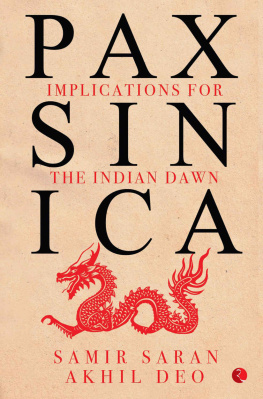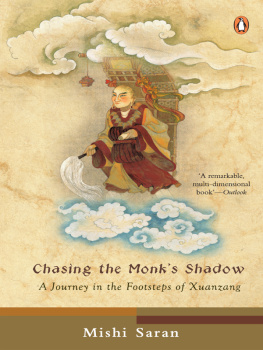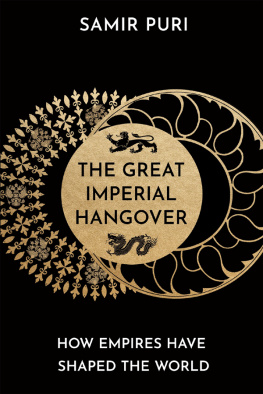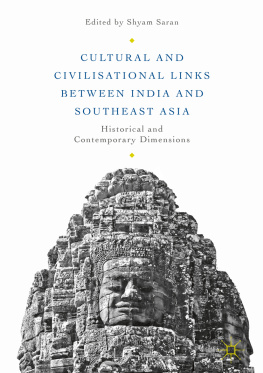Samir Saran - PAX SINICA: Implications for the Indian Dawn
Here you can read online Samir Saran - PAX SINICA: Implications for the Indian Dawn full text of the book (entire story) in english for free. Download pdf and epub, get meaning, cover and reviews about this ebook. year: 2019, publisher: Rupa Publications, genre: Politics. Description of the work, (preface) as well as reviews are available. Best literature library LitArk.com created for fans of good reading and offers a wide selection of genres:
Romance novel
Science fiction
Adventure
Detective
Science
History
Home and family
Prose
Art
Politics
Computer
Non-fiction
Religion
Business
Children
Humor
Choose a favorite category and find really read worthwhile books. Enjoy immersion in the world of imagination, feel the emotions of the characters or learn something new for yourself, make an fascinating discovery.
- Book:PAX SINICA: Implications for the Indian Dawn
- Author:
- Publisher:Rupa Publications
- Genre:
- Year:2019
- Rating:3 / 5
- Favourites:Add to favourites
- Your mark:
- 60
- 1
- 2
- 3
- 4
- 5
PAX SINICA: Implications for the Indian Dawn: summary, description and annotation
We offer to read an annotation, description, summary or preface (depends on what the author of the book "PAX SINICA: Implications for the Indian Dawn" wrote himself). If you haven't found the necessary information about the book — write in the comments, we will try to find it.
PAX SINICA: Implications for the Indian Dawn — read online for free the complete book (whole text) full work
Below is the text of the book, divided by pages. System saving the place of the last page read, allows you to conveniently read the book "PAX SINICA: Implications for the Indian Dawn" online for free, without having to search again every time where you left off. Put a bookmark, and you can go to the page where you finished reading at any time.
Font size:
Interval:
Bookmark:

Praise for the Book
Pax Sinica is essential reading for all who are closely following the efforts made by Beijing to redesign the world order, and for those keen to understand Indias determined and evolving bid to provide a compelling alternative.
Stephen Harper, former Prime Minister of Canada
Are we entering a world ordered by Chinas interests, design and ambition? And how will Indias rise, responses and propositions affect this contested world order in the decades to come? Few questions are more important in the world today, and few are as qualified as Samir Saran to throw much-needed light on them. This book will be a staple read for anyone interested in geopolitics.
Carl Bildt, former Prime Minister of Sweden
Samir Saran and Akhil Deo offer an important Indian perspective on the most significant geopolitical feature of our timethe rise of China and its growing assertiveness. Coming amid the deepening political crises within the Western democracies and their weakening commitment to the post-War global order, Chinas rise confronts India with unprecedented challenges. Pax Sinica presents insights on how Delhi might navigate between the competing imperatives of political accommodation and strategic defiance of a powerful China on Indias doorstep.
C. Raja Mohan, Director,
Institute of South Asian Studies,
National University of Singapore

Published by
Rupa Publications India Pvt. Ltd 2019
7/16, Ansari Road, Daryaganj
New Delhi 110002
Copyright Samir Saran & Akhil Deo 2019
The views and opinions expressed in this book are the authors own and the facts are as reported by him which have been verified to the extent possible, and the publishers are not in any way liable for the same.
All rights reserved.
No part of this publication may be reproduced, transmitted, or stored in a retrieval system, in any form or by any means, electronic, mechanical, photocopying, recording or otherwise, without the prior permission of the publisher.
ISBN: 978-93-5333-664-6
First impression 2019
10 9 8 7 6 5 4 3 2 1
The moral right of the authors has been asserted.
This book is sold subject to the condition that it shall not, by way of trade or otherwise, be lent, resold, hired out, or otherwise circulated, without the publishers prior consent, in any form of binding or cover other than that in which it is published.
For Shri Mukesh Ambani, with gratitude. His remarkable ability to anticipate the future, his steadfast faith in the youth and his unwavering belief in the rise of India are truly admirable and inspiring.
CONTENTS
INTRODUCTION
CHAIRMAN XI AND HIS VISION FOR PAX SINICA
F or the past few years, our world has been in the midst of multiple disruptions. In the heady days of the post-Cold War era, few would have predicted the strain that the international system is experiencing today. In 2019, however, it is hard not to see the structural drivers behind these trends. Technological, political and economic winds have buffeted the norms and partnerships that have anchored the post-World War II international order. The forces of globalization have certainly created new winnersespecially in Asia. However, they have also left behind many in the West. Power and wealth have diffused to an entirely new set of actors: from global cities and networked citizens to powerful corporations and malicious non-state actors. The ideas, frameworks, and institutions of the past are no longer sufficient for a new world. As the second decade of the twenty-first century comes to an end, the reordering of the world has only just begun.
Perhaps no other trend epitomizes the changing of the tides as much as the rise of China. The impoverished Asian giant of the twentieth century has transformed radically over the past forty years to emerge as a twenty-first-century superpower. Chinas miraculous rise can be traced back to Deng Xiaopings decision to open its economy to the world, allowing foreign capital, skill, and technology to build domestic industrial capacity. Economic transformation was only one part of his legacy. At home, Deng carefully created a system of collective leadership that would guard against individual excess, and strongly advocated a peaceful role for China in international affairs, calling for the country to remain focused on its domestic development. This thinking paved the way for four decades of unstoppable growth. For the incumbent global powers of the day, Chinas foreign and economic policies seemed like a good deal. Western business could exploit labour arbitrage and outsource significant parts of their manufacturing requirements to China, while consumers benefited from lower prices. The economic value proposition that China offered was sufficient for the United States (US) and its allies to overlook working with what was otherwise a staunchly authoritarian and opaque regime. The political attention devoted to the erstwhile Soviet Union and then to a never-ending saga in the Middle East distracted from the rise of China on the world stage. The quiet growth of China suddenly became visible to the world in 2012. The country had a new general secretary, Xi Jinping, who unapologetically asserted the primacy of the Communist Party and looked to end Chinas humiliation through a more aggressive foreign policy.
Xi was also aware that he was operating in a world order that was fundamentally different from that at the turn of the century. The global financial crisis in 2008 had exposed the fragility of Western capitalism, while the year 2016 had, in many ways, exposed weaknesses in democratic processes and institutions. Chairman Xi saw an opportunity in these disruptionsan opportunity to cement his place in Chinas history, and Chinas place in the conduct of world affairs. In addition to recognizing Chinas status as a political and economic superpower, once Chairman Xi had come to power, the world had to finally admit that the fundamental assumption about Chinas trajectory was based on an incorrect premise; economic liberalism would not bring about greater political freedoms. Indeed, as this book will show, Chinas economic miracle has only reinforced its unique brand of political authoritarianism and state-led capitalism.
THE RISE OF CHINA: A COMMON THREAD
Sitting in New Delhi in 2019, there are five stories that showcase Xis unmistakable ambition and vision. The first story is that of the nineteenth National Congress of the Communist Party, which has undoubtedly already made its place in history. For Xi, it cemented his position as the most powerful Chinese leader since Chairman Mao. By christening himself as the core leader who has injected Xi Jinping thought in the Chinese constitution and abolished term limits for the post of Chinas president, not only has Xi firmly entrenched himself in the pantheon of Chinas ideological history, but he has also disrupted the principle of collective governance that has held the country in good stead. For China, the Congress laid out a more ambitious agenda for a new era in which the nation is to become a global leader in terms of composite national strength and international influence by the middle of the twenty-first century. Xis promise to lead China into this new era has seen him double down on the primacy of the party, the need for indigenous technological progress, and a strong military. For the world, the nineteenth National Congress signalled a more assertive China. Moreover, it indicated Beijings willingness to offer a new proposition for the world, which Xi called Socialism with Chinese Characteristics for a New Era. Characterized by an effective blend of political authoritarianism and state capitalism, this was a model for organizing societies and the international system that China began significantly investing in.
Next pageFont size:
Interval:
Bookmark:
Similar books «PAX SINICA: Implications for the Indian Dawn»
Look at similar books to PAX SINICA: Implications for the Indian Dawn. We have selected literature similar in name and meaning in the hope of providing readers with more options to find new, interesting, not yet read works.
Discussion, reviews of the book PAX SINICA: Implications for the Indian Dawn and just readers' own opinions. Leave your comments, write what you think about the work, its meaning or the main characters. Specify what exactly you liked and what you didn't like, and why you think so.











